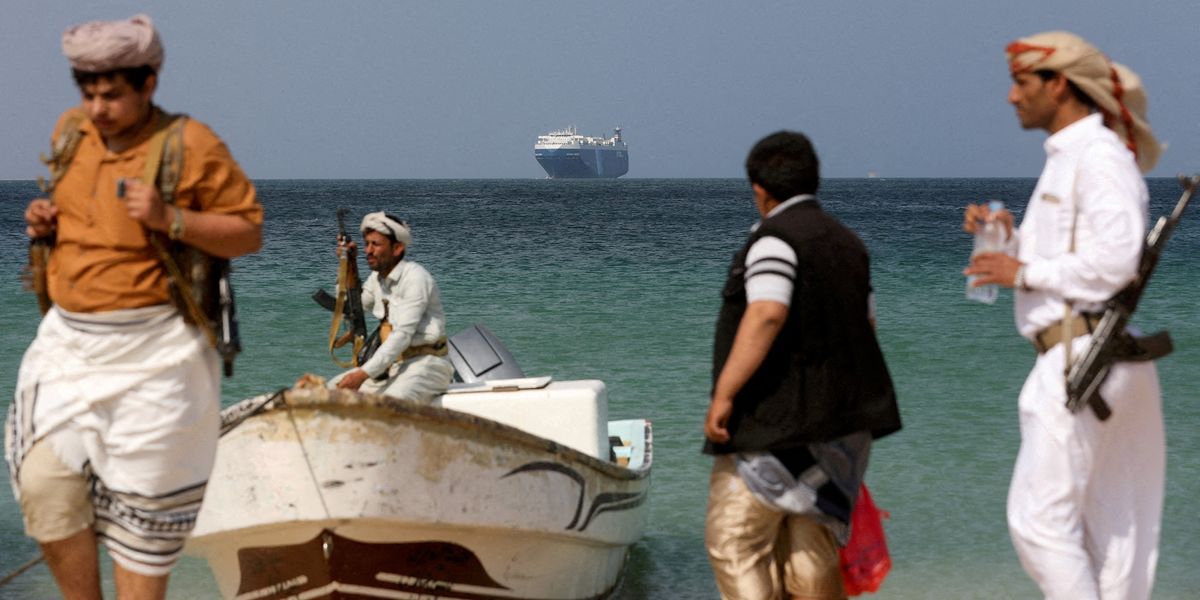Any thoughts that bombing Yemen last week would bring a swift end to Houthi attacks in the Red Sea have been quickly dispelled. The Yemeni militant group, after nine years of civil war and bombardments by Saudi Arabia and the UAE (with U.S.-made munitions), has already retaliated against U.S. airstrikes several times in the last few days.
But that hasn't stopped the Biden Administration from launching a fourth round of attacks at Houthi targets Yemen Wednesday night.
According to reports, U.S. Navy warships destroyed 14 Houthi missiles that were staged in a "Houthi-controlled" area of Yemen and posed an "imminent threat" to U.S. forces in the region.
Hours earlier, the Houthis struck and hit a U.S.-owned commercial vessel in the Red Sea with a one-way attack drone. Earlier this week, a similar vessel was hit by a ballistic missile. Little damage and no casualties were reported in either incident.
There have been over 30 attacks on commercial vessels as well as thwarted attacks officials say were aimed at U.S. and UK Navy in the region since the Gaza war began. The Houthis have said that they won't stop until Israel’s “crimes in Gaza stop and food, medicines and fuel are allowed to reach its besieged population.” My colleague Blaise Malley writes today that the Biden Administration — rather than seeing this as an opportunity to help broker some sort of ceasefire or cessation of the violence in Gaza, which has killed over 25,000 people, mostly civilians — has chosen to fight fire with fire.
There has been much ado about the Houthi threat to international shipping and the costs to the global economy. Interestingly, Eugene Gholz, a Notre Dame University and Cato Institute scholar, has pushed back on this narrative. He writes that, while ballistic missiles pose more of a risk, the drones cannot "pack a punch," and shipping companies know this.
That is why so many ships have simply continued about their business — and why we didn’t hear about substantial casualties or damage to target ships between the start of the attacks in November and the start of the protective Operation Prosperity Guardian in mid‐December.
Moreover, the cost of diverting shipping away from the Red Sea is not very significant in the grand scheme of the global economy—particularly to Americans. It may be annoying for certain companies (shipping companies or companies waiting to receive shipped products), but overall, the costs are small, and companies deal with disruptions of one type or another all the time. ...
He adds this, again challenging conventional wisdom that the West must bomb Yemen to save the economy:
Yes, it can take several weeks longer for cargo to circumnavigate Africa rather than going through the Suez Canal and Red Sea. The greater distance takes more fuel, and the merchant mariners aboard would draw more salary for the additional time at sea, but fuel and salary costs for cargo ships are trivial compared to the value of the cargo in the thousands of containers aboard (remember, each container might carry 20+ tons of goods across which those increased costs are amortized).
The real, though still minor, cost of the additional time at sea is that it takes a larger fleet of ships to maintain the pace of deliveries if each ship spends more time sailing. The good news is that there are already surplus cargo ships in the global shipping fleet.
It would seem that the real threat here is the escalation from continued U.S. airstrikes, which are killing people. As RS has reported on these pages time and again, the Houthis are battle hardened and even emboldened by the reaction of the West to their provocations. In a piece I published at the American Conservative today, a number of realist voices are decrying the folly of once again falling into a spiral of retaliatory violence that will likely lead to a real military crisis, even the death of U.S. service members, before it is done.
"They (strikes) won’t work. They won’t sufficiently degrade Houthi capability or will stop their attacks on shipping,” says Ben Friedman, senior fellow of Defense Priorities. “Why do something that is so evidently reckless? Restraint reminds us that no such law says we must conduct airstrikes that won’t work. We always have the option not to employ pointless violence.”














